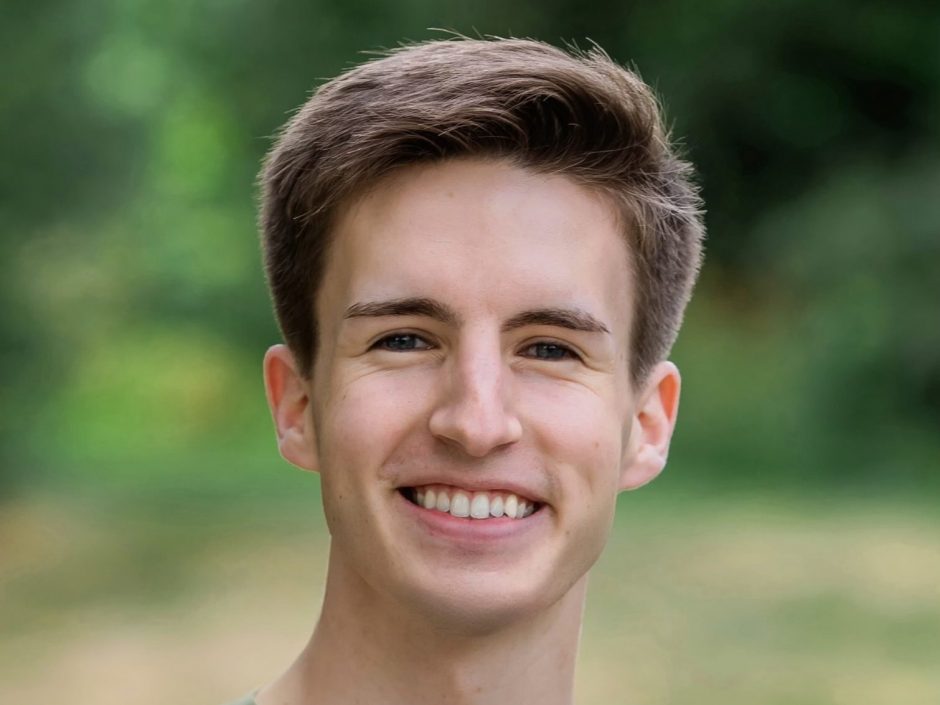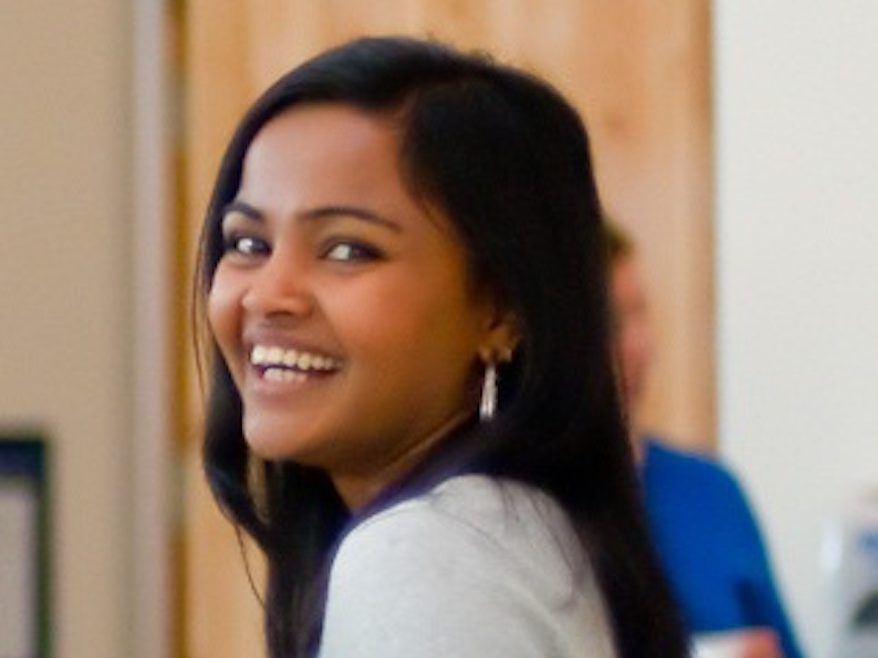
Jack Suchodolski, Sustainability Ambassador Lead (second from left)

Kshamta Hunter, Manager of Student Sustainability Engagement
Tuesday, April 25, 2023
Interview by Fumika Noguchi, Climate Emergency Response team
You may have seen this iconic group of students on campus wearing their coordinated shirts as they deliver a sustainability program or event. They are the Sustainability Ambassadors, a team of highly dedicated students who are working to educate UBC students about sustainability, encourage student engagement with sustainability, and connect sustainability groups on campus.
Kshamta Hunter and Jack Suchodolski are two individuals who have been working hard at developing programming for the Sustainability Ambassadors this past year. Kshamta Hunter is the manager for the Sustainability Ambassadors Program who is continuously striving to improve programming and meet the evolving demands from students for more sustainability leadership opportunities. Jack Suchodolski is the Sustainability Lead for this year’s inaugural Climate Cohort and is a graduating Geography student specializing in Environment and Sustainability.
Join us in this interview to learn more about the Sustainability Ambassador’s Program, how the Climate Emergency Fund (CEF) has helped the program grow, and hear advice from Jack on getting involved in sustainability leadership.
WHAT IS YOUR CLIMATE STORY?
Jack: Reflecting on the journey that my climate story has taken me thus far, it’s kind of crazy to look back and see the world view that a lot of us had as little as five years ago, ten years ago, and to see how much has drastically changed even since then. A couple of my friends from high school were avid environmentalists and I was initially intimidated by their platform and what it implied about our future. Yet slowly but surely, the conversations I continued having with them really began to inspire me to get involved, and I’m very grateful for them to have had that influence on me.
I ended up coming to Vancouver to study at UBC in 2019, and that was right around the time when the global climate strikes were happening and when UBC declared its climate emergency. Knowing the university was eager to be a leader by responding to the growing climate movement, and having that be my first impression of UBC, it confirmed for me that this is the path I wanted to take and pursue work dealing with the climate emergency.
Kshamta: My climate or sustainability story really started around 2006 and 2007 when I was doing my Bachelor of Education at UBC, and that’s when I noticed some of the gaps that we have in our education system. After my B. Ed, I worked in the school system for about four years, and there, I realized the gap in terms of the values around what we want our students to learn and how itis reflected in our curriculum, teaching and learning opportunities, and experiences that we offer.
I came back to do my masters around sustainability, and at that time there was no sustainability education at UBC. I was privileged to have a supervisor who was able to support me. During my masters at UBC, I was offered a new and emerging sustainability advisor position with the Sustainability Initiative where I started doing a lot of this work on the grounds with students. I was encouraged by the students’ leadership and their activism, which led me into doing more things around climate specifically. As such, my climate or sustainability story starts and keeps going with education.
AS A SUSTAINABILITY LEAD, WHAT ARE SOME OF THE VALUES THAT GUIDE YOUR WORK IN IMPLEMENTING CLIMATE PROGRAMMING FOR AND WITH THE SUSTAINABILITY AMBASSADORS IN YOUR CLIMATE COHORT?
Jack: One of the first values that come to mind is inclusivity. In the Sustainability Leads’ planning process last summer, we wanted to bring in as many perspectives and topics as possible to expose the Ambassadors to a range of concepts within the realm of sustainability that we identified were important to have. We also wanted to make sure that it was a space for the Ambassadors’ own voices to be heard and to feel like they are included in their own learning process. From the start, we made sure that it was a collaborative process, both between the Leads and with the Ambassadors, of ensuring inclusivity in the instructional, discussion-based programming we offered over the past year and that the perspectives the Ambassadors brought were consistently encouraged to be shared and elevated.
Another value is youth leadership, which I think allows us to derive essential inspiration from one another. We’re all in the same boat of wanting to be involved, but it’s an ongoing process to figure out what is most effective in engaging others in climate work and how to do this work while simultaneously juggling the massive stressors that naturally accompany the regular use of terminology like ‘climate emergency.’ So, having a community of young people that are interested and passionate about this work allows folks to lean on one another for support and have confidence that we’re all in this together.
WHAT ARE SOME OF THE CHALLENGES YOU HAVE FACED IN CLIMATE WORK AND HOW, IF POSSIBLE, HAS THE CEF ALLOWED YOU TO OVERCOME THEM?
Kshamta: There are always challenges in this work. A challenge that the CEF helped us navigate is increasing program capacity. There has been a growing interest from students on our campus to engage with issues around climate justice and sustainability. The Sustainability Ambassadors program receives a lot of interest from students as we get hundreds of applications every year. Before CEF, we could only take about 20 to 25 students because of our capacity. CEF has allowed us to develop an innovative new program framework to expand and increase the program capacity, which has essentially doubled the number of students we accept in the program this year.
We were able to adapt a cohort system where we have five different cohorts, each with a team of ten ambassadors. The CEF was instrumental in making sure that we can test the new model, increase program capacity, and compensate student lead positions while offering the students the experience and opportunities that they are seeking in this area of climate action and sustainability.
WHAT ARE SOME OF THE HIGHLIGHTS OF BEING A PART OF THE SUSTAINABILITY AMBASSADORS PROGRAM? DO YOU HAVE ANY ADVICE FOR STUDENTS WHO WANT TO GET INVOLVED?
Jack:
One of my highlights is the team of Sustainability Leads I was able to work with this year. It was a great group of folks, and we were able to build off our collective strengths and complement each other’s areas of growth, which in turn, allowed us to develop a strong curriculum, successfully implement it, and maintain motivation to continue a yearlong program as student peer leaders.
The other highlight, on a more personal level, is getting incredibly valuable facilitation experience. We all had to learn how to tread the line between facilitating weekly discussion-based programming while recognizing our limitations of not being an expert on each topic we engaged with. So, routinely practicing how to help produce fruitful discussions and brainstorming sessions and when to employ insights from your own educational or experiential background has been valuable.
As for advice for students trying to get involved, it’s tough sometimes because there’s a limit to the opportunities that are currently available on campus, but I think part of it is simply reaching out to folks who either lead or are involved in programs like Sustainability Ambassadors. Staff members and professors across campus are undoubtedly busy most of the year, but there are always those who are willing to respond to an email and provide insight to opportunities for folks. Just hearing that someone is really interested and wants to get involved is motivation enough to make a staffer or professor (or student) want to help in any way they can, so starting that conversation can really do wonders!
If you’re not sure who to reach out to specifically, I’d recommend joining organizational newsletters like Sustainability Hub’s, Climate Hub’s, the Centre for Climate Justice’s, and following their social media accounts. From there, you can get a sense of which staff members, professors, or students are doing work you find interesting. Then, you can reach out if you have questions about their work or want to get input on any similar work they know of, because that’s where a lot of unexpected opportunities can come from.

Interested in Jack’s work? Learn more about how you can join the Sustainability Ambassadors Program too!
HOW DO YOU SEE THE SUSTAINABILITY AMBASSADORS PROGRAM EVOLVING TO CONTINUE MEETING STUDENT DEMAND FOR MORE SUSTAINABILITY AND CLIMATE LEADERSHIP OPPORTUNITIES? DO YOU HAVE ANY FUTURE PLANS IN THE WORKS?
Kshamta: The idea and the hope is to increase capacity by bringing more students into this mix of learning about climate and sustainability but also action. My ideal, long-term scenario would be that this information is embedded in all the activities they’re doing as part of their degree, so students don’t have to look for these opportunities outside of the required coursework and activities.
How do we make sure that students are getting the recognition? We have started navigating this process this year by offering Directed Studies credits to the Ambassadors for their work and commitment. The ideal situation will be to embed sustainability leadership and climate education to a certain extent into all courses across UBC.
The majority of Sustainability Ambassadors applications are predictable in terms of students’ discipline, including Forestry, LFS, and Geography, all those usual suspects. We need to go beyond that and make sure that this is already embedded in degrees, so that students who are not necessarily aware of or looking for these opportunities are still able to engage. This is an ideal vision and something I want to work towards of embedding the program experience within courses, which includes hands-on action and experiential learning in interdisciplinary teams through mentor supported project work.
